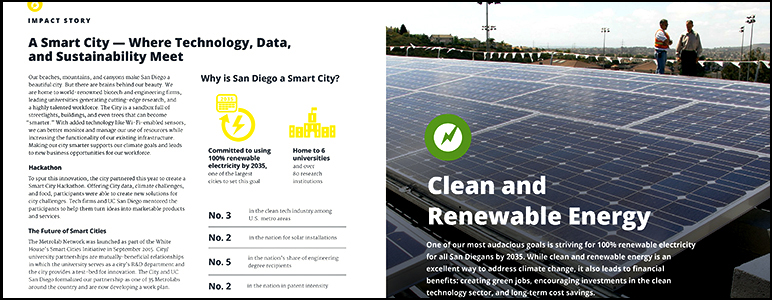


It’s been a year since the city of San Diego approved its climate action plan (CAP) with the aim to create a cleaner, greener San Diego now and for years to come by eliminating half of the city’s greenhouse gas (GHG) emissions and generating all of its electricity from renewable sources by 2035.
In a recent 2016 CAP Annual Report, the city offers some facts and figures that show progress has been made over the past six years that puts the city ahead at this early point in the plan and offers promise for creating increased local job opportunities in clean energy technologies.
Originally printed in the Times of San Diego opinion section.
The CAP targets for environmental factors were all established with 2010 baseline measurements – the last time a full citywide analysis was conducted. Analysis conducted this year already shows a 17 percent reduction in GHG emissions, 35 percent use of renewable electricity, 16 gallons less per capita in water consumption and a 64 percent diversion rate for the Miramar Landfill among other accomplishments. This progress builds on strong state policies, such as the renewable portfolio standard and mandatory water restrictions. The city will have to ramp up efforts in the years ahead to achieve deeper reductions, but Mayor Kevin Faulconer called the progress significant and pledged, “We’re just getting started.”
In addition to environmental benefits, there are considerable economic returns for the entire region in implementing the city’s CAP. For the 2016 Annual Report, the Center for Sustainable Energy (CSE) conducted research and analysis to assess how clean technology creates jobs.
CSE reviewed reports associated with CAP-related industry sectors and made quantitative analysis of job growth within associated industry sectors over the past five years. We created a baseline jobs analysis using Bureau of Labor Statistics data during 2010-15 that categorized 74 industries in San Diego County into the CAP’s five key strategies: energy and water efficient buildings, clean and renewable energy, climate resilience, transportation and zero waste.
The jobs data showed a 10.2 percent growth over five years in industries related to CAP strategies, higher than San Diego’s overall regional job market growth of 9.5 percent. More than 122,500 jobs were identified in over 800 clean tech companies in the county. The city plans to track how such jobs grow in the coming years based on CSE’s work to show the correlation between climate action and economic opportunities.
According to our report, energy efficiency makes up the largest share of the advanced energy jobs in the state, comprising about 70 percent of the total advanced energy jobs. Clean and renewable energy jobs come in second, as the state’s solar industry continues to grow, adding more than 20,000 new jobs in 2015, surpassing 75,500 employees in total, according to The Solar Foundation. More than 10 percent of these jobs are in San Diego.
It is also interesting to note that according to research by Advanced Energy Economy Institute, employment in California’s advanced transportation industry grew by 65 percent in 2015 and the state’s advanced electricity generation segment grew by 50 percent.
Clearly, investments in clean and efficient energy technologies are an effective way to create long-term job opportunities and training to build pools of skilled workers, especially members of diverse communities with high unemployment, who can contribute to CAP strategy-related industries.
The city of San Diego has worked hard on planning and creating strong CAP policies and thoroughly engaging community and business stakeholders to help set the plan’s goals into action. We are certain that as more parts of the plan become actionable and implemented, it will create many positive impacts and jobs for all local communities and people at every socio-economic level.

